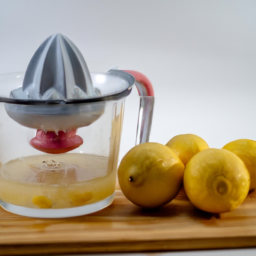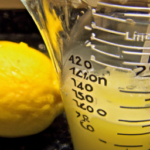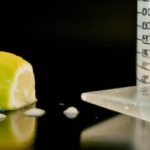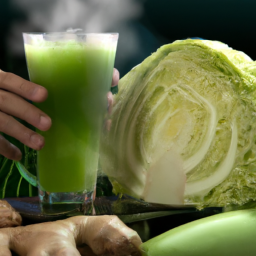Sitting here, enjoying a freshly made glass of lemonade, I can’t help but be amazed by the surprisingly large amount of juice I was able to squeeze out of just half of a lemon. Extracting juice from a lemon may seem like a challenging task, but with the right knowledge and technique, you’ll be surprised by the yield. Before juicing, I rolled the lemon firmly on the countertop to help break down the membranes inside, which made it easier to extract more liquid. Applying steady pressure with a juicer, the juice from half a lemon poured out in quantities much larger than I had anticipated. It’s remarkable how simple adjustments can result in significant gains when it comes to getting the most out of every fruit.
The amount of juice that can be extracted from a half of a lemon depends on a variety of factors, including the ripeness and size of the lemon, as well as the method used to extract the juice.
In this article, we’ll explore the average yield of half a lemon, as well as tips and tools for getting the most juice possible. Whether you’re making lemonade, salad dressing, or using lemon juice for a marinade, understanding how much juice you can get from a half of a lemon is essential for getting the most flavor out of this versatile fruit.
Key Takeaways
- The average yield of juice from half a lemon is 2 tablespoons.
- Factors affecting juice yield include ripeness, size, and extraction method.
- Using a citrus reamer or electric juicer is the most efficient method for extracting juice.
- Proper storage of lemon juice includes using an airtight container, labeling with the date, and freezing in ice cube trays.
Factors that Affect Juice Yield
Did you know that the ripeness of the lemon and the amount of pressure applied when squeezing can affect the juice yield?
When it comes to juice extraction, the ripeness of the lemon plays a crucial role in determining the amount of juice that can be extracted. A fresh, ripe lemon will yield more juice than an older one that has been sitting around for too long. The juiciness of the lemon is also affected by the temperature and the humidity it has been exposed to.
Another important factor that affects juice yield is the amount of pressure applied when squeezing the lemon. When using a citrus squeezer, it’s important to apply just enough pressure to extract the maximum amount of juice. If too much pressure is applied, the bitter oils from the lemon’s skin can be extracted, making the juice taste unpleasant. If too little pressure is applied, the juice yield will be lower than expected.
Now that we’ve covered the factors that affect juice yield, let’s move on to the average yield of half a lemon.
Average Yield of Half a Lemon
You’ll be surprised to know that the average yield of a single lemon half is around 2 tablespoons of liquid. That’s not a lot, but it’s enough to add a refreshing tang to your dishes and drinks.
Lemon juice is packed with health benefits, such as vitamin C, which helps boost your immune system, and antioxidants, which protect your cells from damage. Moreover, its acidity levels make it an excellent natural preservative and tenderizer, making it a versatile ingredient in any recipe.
To get the most out of your lemons, it’s essential to learn a few tricks to maximize their juice yield. After all, every drop counts, especially when you’re cooking or mixing drinks.
So, in the next section, I’ll share some tips for getting more juice out of your lemons without wasting any of their precious liquid.
Tips for Getting More Juice
To maximize the potential of your citrus fruits, it’s crucial to employ various techniques to extract their flavorful, health-boosting liquid. Here are three tips to get the most juice out of your lemons:
-
Use a citrus reamer: A citrus reamer is a tool specifically designed to extract the most juice from citrus fruits. It’s easy to use and can help you get more juice out of your lemon than squeezing it by hand.
-
Roll the lemon: Before cutting the lemon, roll it on a hard surface with the palm of your hand. This will help break down the internal membranes and make it easier to extract the juice.
-
Maximize yield: To get the most juice out of your lemon, cut it in half crosswise instead of lengthwise. This way, the juice will be closer to the surface and easier to extract.
Using these techniques can help you get the most juice out of your lemons and other citrus fruits. With the right tools and a little bit of know-how, you can enjoy the full flavor and health benefits of these delicious fruits.
As we move on to the next section about tools for juicing, keep in mind that these tips can also be applied to other citrus fruits like oranges and limes.
Tools for Juicing
Get ready to elevate your citrus juicing game with these essential tools that will make the process easier and more efficient. First, invest in a good quality citrus juicer. There are various types of citrus juicers available, including handheld reamers, electric juicers, and manual presses.
Electric juicers are the most efficient and can handle large quantities of citrus fruits, while handheld reamers are more affordable and require less maintenance. When choosing the right citrus fruits for juicing, look for those that are fully ripe and have a smooth skin. Avoid fruits with wrinkles, soft spots, or bruises as they may be overripe or damaged.
It’s also important to properly maintain your juicer by cleaning it after each use to prevent buildup of pulp and seeds. With the right tools and choosing the best citrus fruits, you’ll be able to extract the maximum amount of juice with ease and in no time.
Now, if you don’t have a juicer or want to try alternative methods for extracting juice, there are a few options available.
Alternative Methods for Extracting Juice
I’ve found that juicing can be a hassle when you don’t have the right tools. But fear not, there are alternative methods for extracting juice that don’t require any special equipment.
Squeezing by hand is a classic method that’s easy and effective. Another option is using a fork to puncture and squeeze the fruit. And if you’re feeling adventurous, blending the lemon can also yield a tasty juice.
Squeezing by Hand
Squeezing the juice of half a lemon by hand requires applying pressure and twisting the lemon in a circular motion. This is one of the most common hand squeezing techniques that people use for lemon juice extraction.
First, cut the lemon in half with a sharp knife. Then, with the cut side facing down, press and twist the lemon with your hand over a bowl or container. Keep squeezing until you’ve extracted all the juice from the lemon.
Using this method, you can extract the juice from a lemon easily and quickly. However, if you find it difficult to extract all the juice, you can try microwaving the lemon for a few seconds to make it easier to squeeze. Alternatively, you can roll the lemon on a hard surface before cutting it in half.
Using a fork is another option for extracting lemon juice, and we’ll explore that method in the next section.
Using a Fork
If you’re looking for an alternative method for extracting lemon juice, try using a fork. This creative solution has been around for centuries, with historical records showing the use of a fork to extract juice from citrus fruits as far back as the 16th century.
Here are some reasons why using a fork might be a good option for you:
- It’s easy and convenient: You probably already have a fork in your kitchen, so you don’t need to go out and buy any new equipment.
- It’s a great arm workout: Squeezing a fork into a lemon requires some muscle power, making it a great way to get a little exercise while you cook.
- It’s a fun activity for kids: If you’re cooking with kids, using a fork to extract lemon juice can be a fun and interactive way to get them involved in the process.
- It’s a good option if you don’t have a juicer: If you don’t have a juicer, using a fork can be a good alternative for extracting small amounts of juice.
Using a fork to extract lemon juice is just the first step in making a delicious lemony dish. Once you’ve extracted the juice, the next step is to blend the lemon with the other ingredients to create a cohesive dish.
Blending the Lemon
To blend the lemon with the other ingredients, simply add the extracted juice to the mixture and stir until everything is well combined. However, there are blending techniques that can enhance the flavor combinations of the juice.
For instance, some people prefer to blend the lemon with a bit of honey or sugar to give it a sweeter taste. Others may add a pinch of salt or pepper to give it a savory twist. Experimenting with different blending techniques can open up a world of possibilities for the flavor of your lemon juice.
Blending the lemon is just one step in the process of making lemon juice. Once you have the perfect blend, it’s important to store the juice properly to preserve its freshness.
So, let’s move on to the next section and learn how to store lemon juice.
How to Store Lemon Juice
Storing lemon juice properly can make it last longer and stay fresh. Here are some tips on how to extend the shelf life of lemon juice and make the most out of your leftover juice:
- Store the juice in an airtight container to prevent exposure to air, which can cause oxidation and spoilage.
- Keep the container in the refrigerator, where the temperature is low enough to slow down bacterial growth.
- Consider freezing the juice in ice cube trays for convenient portioning and easy access to small amounts of lemon juice.
- Label the container with the date you squeezed the lemon juice, so you can keep track of its freshness and avoid using old juice.
- Use the leftover juice in marinades, dressings, sauces, or cocktails to add a tangy flavor and acidity to your dishes.
By following these simple steps, you can make your lemon juice last for weeks or even months, without compromising its quality and taste.
Now that you know how to store lemon juice, let’s explore other ways to use this versatile ingredient in your cooking and cleaning routines.
Other Uses for Lemon Juice
Now that we’ve talked about how to store lemon juice, let’s explore some other uses for this versatile ingredient. Did you know that lemon juice has amazing benefits for your skin? It can help to brighten and even out your complexion, as well as reduce the appearance of dark spots and acne scars. Simply mix a few drops of lemon juice with water and apply it to your face with a cotton ball. Leave it on for a few minutes before rinsing off with warm water. Your skin will feel refreshed, rejuvenated, and glowing!
Another surprising use for lemon juice is as a natural cleaning agent. Its acidity makes it an effective cleaner for a variety of surfaces, including countertops, sinks, and even stainless steel appliances. Mix lemon juice with baking soda to create a paste that can be used to scrub away tough stains and grime. It’s also great for freshening up your garbage disposal and cutting boards.
With so many uses, lemon juice is truly a kitchen staple that everyone should have on hand.
As we continue our exploration of all things lemon, let’s take a closer look at the different varieties of lemons available.
Lemon Varieties
Lemon varieties have unique characteristics and flavors that make them ideal for different culinary uses. As someone who loves to cook, I’m fascinated by the array of lemons available in the market.
Below are three popular lemon varieties and their distinct features:
-
Eureka: This is the most common type of lemon found in grocery stores. Eurekas are oval-shaped and have a bright yellow skin that’s thick and bumpy. They have a tangy, acidic flavor and are perfect for squeezing over fish and salads.
-
Meyer: This lemon variety is a cross between a lemon and a mandarin orange. Meyers have a thin, smooth skin that’s deep yellow-orange in color. They’re sweeter than other lemons and have a hint of floral flavor. Meyer lemons are great for making lemon curd and adding to baked goods.
-
Lisbon: This lemon has a thick skin that’s pale yellow and smooth. They’re tart and juicy, making them a popular choice for lemonade and cocktails. Lisbon lemons are typically larger than other varieties and are widely used in lemon cultivation.
Speaking of lemons, they’re in season from November to April, making it the perfect time to experiment with new recipes. From lemon bars to lemon roasted chicken, the possibilities are endless.
Let’s dive into some delicious lemon recipes next.
Lemon Recipes
I absolutely love using lemons in my cooking and baking. When life gives you lemons, make lemonade!
But that’s not all – lemon bars and lemon chicken are also two of my favorite dishes to make. With their tangy, refreshing flavor, lemons add a delicious twist to any recipe.
Let’s explore some tasty lemon recipes together!
Lemonade
Sipping sweet and sour lemonade is a satisfying way to quench your thirst on a scorching summer day. Not only is it a refreshing beverage, but it also has numerous health benefits. Lemon juice is rich in vitamin C, which boosts the immune system and helps prevent diseases. It also aids in digestion, detoxifies the body, and reduces inflammation. If you’re looking for a healthier alternative to traditional lemonade, you can try adding honey or agave nectar instead of sugar.
To emphasize the benefits of drinking lemonade, here’s a table that compares the nutritional content of lemonade with other popular drinks:
| Drink | Calories per cup | Sugar per cup (g) | Vitamin C per cup (mg) |
|---|---|---|---|
| Lemonade | 99 | 24 | 25 |
| Soda | 136 | 33 | 0 |
| Orange Juice | 112 | 21 | 124 |
| Sports Drink | 80 | 21 | 0 |
| Iced Tea | 99 | 22 | 0 |
As you can see, lemonade has the lowest amount of calories and sugar compared to the other drinks listed. It also has a high amount of vitamin C, which is essential for maintaining a healthy immune system. So, the next time you’re feeling thirsty, consider making yourself a glass of sweet and tart lemonade.
Transitioning into the subsequent section about ‘lemon bars’, I couldn’t help but think about how lemonade and lemon bars both share the same tangy flavor that’s perfect for summer. While lemonade is a refreshing drink, lemon bars are a delicious dessert that’s perfect for satisfying your sweet tooth.
Lemon Bars
You’ll be delighted by the tangy sweetness of these lemon bars, which are the perfect balance of tart and creamy. The crust is buttery and crumbly, and the filling is silky and bursting with lemon flavor. These bars are perfect for a summer picnic or a brunch party, and they’re always a crowd-pleaser.
Here are some variations and presentation ideas that will make your lemon bars stand out:
- Add a layer of raspberry or blueberry jam between the crust and filling for a fruity twist.
- Sprinkle some toasted coconut flakes on top of the bars for a tropical touch.
For presentation, try cutting the bars into small squares and arranging them on a platter in a checkerboard pattern. You can also dust them with powdered sugar or garnish them with lemon zest curls for a fancy look.
Whether you serve them at a potluck or a fancy dinner party, these lemon bars will be a hit.
Now, let’s move on to the next topic: lemon chicken.
Lemon Chicken
Get ready for a flavor explosion in your mouth with this succulent and zesty lemon chicken dish. This recipe has become a staple in my kitchen because it’s easy to prepare and always impresses my dinner guests.
The key to this dish is the marinade, which infuses the chicken with a bright, citrusy flavor that perfectly complements the tender meat. There are endless possibilities when it comes to marinade options, but I like to use a mixture of fresh lemon juice, garlic, olive oil, and herbs like oregano and thyme.
Simply mix the ingredients together and let the chicken soak in the marinade for at least an hour, or overnight for maximum flavor. As for cooking techniques, I prefer to grill the chicken for a smoky charred flavor, but it can also be baked or sautéed to perfection.
Serve with a side of roasted vegetables and a glass of chilled white wine for a complete meal that’s sure to impress.
Frequently Asked Questions
Can I use bottled lemon juice instead of fresh lemon juice?
I prefer using fresh lemon juice for its superior taste and health benefits. Bottled lemon juice may be convenient, but it lacks the complexity and brightness of fresh juice. Concentrate is a good option for baking and marinades.
How long does freshly squeezed lemon juice stay fresh?
Freshly squeezed lemon juice can stay fresh for up to a week if stored properly in an airtight container in the fridge. To use leftover juice, add it to salad dressings, marinades, or mix with water for a refreshing drink.
Can I freeze freshly squeezed lemon juice?
As a lover of citrus, I’ve experimented with freezing freshly squeezed lemon juice. It’s a great way to preserve it for future lemon juice recipes. Just make sure to store it properly and use within six months for optimal flavor.
Is there a way to extract juice from a lemon without a juicer or reamer?
I’ve found that there are a few lemon squeezing techniques that don’t require a juicer or reamer. One method involves rolling the lemon on a hard surface before cutting and squeezing. Alternatively, lemon juice substitutes like vinegar or lime juice can be used in a pinch.
How do I know if a lemon is ripe enough to yield a lot of juice?
To determine optimum ripeness, I gently press the lemon to feel for a slight give. Then, I use a rolling motion on a hard surface to get the most juice. Squeezing technique matters more than ripeness.
Conclusion
Well, after all that talk about juicing lemons, I’m feeling a bit sour. But fear not, I’ve learned much about the elusive juice of half a lemon.
It seems that there are many factors that can affect the yield, from the ripeness of the fruit to the temperature of the room. Who knew that lemon juice was so temperamental?
Despite the challenges, I have come away with a newfound respect for the humble lemon. With the right tools and techniques, it’s possible to extract every last drop of juice from this fruit.
And let’s not forget about the endless possibilities for using lemon juice in cooking and beyond. So the next time you’re faced with the daunting task of juicing a lemon, remember that with a little perseverance and a lot of elbow grease, you can squeeze out a delicious and refreshing burst of citrus.
Cindy thoroughly researches juicing trends, techniques, and recipes to provide readers with practical advice and inspiration. Her writing style is accessible, engaging, and designed to make complex concepts easy to understand. Cindy’s dedication to promoting the advantages of juicing shines through her work, empowering readers to make positive changes in their lives through the simple act of juicing.

















